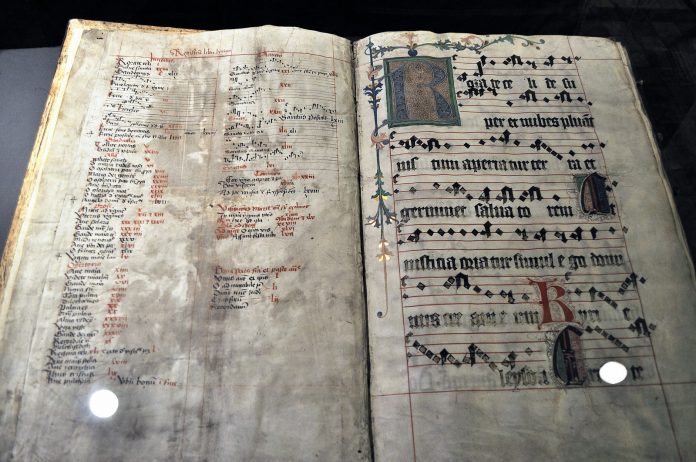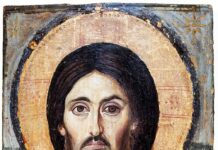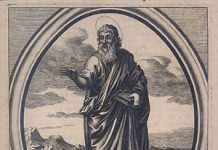
Be alert at all times, praying that you may have the strength…to stand before the Son of Man (Lk.21: 36). ⧾
The first Sunday of Advent marks the beginning of a new liturgical year; and during this year the Sunday Gospel readings will be taken from the Gospel of St. Luke, the Evangelist known as the scribe of Christ’s meekness. His Gospel records the gentleness of the Saviour who became man to deliver us from the cruelty of paganism and the tyranny of sin. Sacred Tradition tells us that St. Luke was both a physician and an artist. The sensitivity of the artist and the compassion of a physician are reflected in the way he records the events of our Lord’s earthly life. When we read his gospel attentively we are given to see the merciful Face of Christ who reveals to us the true nature of God. The psalmist declares: When you said, Seek my face; my heart said unto you, your face, LORD, will I seek (27:8). We do well to approach this new liturgical year with this in mind. We will commemorate the mysteries of Our Lord’s earthly life once again fully expecting to learn more about God and ourselves in relation to the Mystery of God. With the Prophets who heralded the coming of our Saviour we will seek the face of God reflected as it is in the Holy Face of our Saviour.
At the beginning of this new liturgical year we are on the threshold of a cycle, an annual cycle centred on Christmas, Easter and Pentecost. As we celebrate the Liturgy of Advent, the ancient expectancy of the Messiah is made present; and in recalling the long preparation for the Saviour’s first coming, we renew our ardent desire for His second coming (Cf. Catechism of the Catholic Church, 524). Past, present and future especially penetrate one another in the liturgy of Advent although this is true of the celebration of any of the Christian mysteries.
As the mysteries of the life of Christ our Lord are recalled, time and eternity, Christ and the Church, the divine and the human, these are all interwoven in the course of the liturgical year; such that, our bodies, that is, our bodily existence on earth becomes a living sacrifice united to the Sacrifice of Jesus. This transformation expresses the purpose and goal of our worship: our transformation in Christ. In the sacred liturgy we encounter the living God and by means of His grace and our conformity to the mysteries of the life of Christ, our Father looks upon us and sees in us the Face of His Son. In his treatise On the Kingship of Jesus, St. John Eudes helps us to understand how this comes about. The Son of God wills to give us a share in his mysteries and somehow to extend them to us. He wills to continue them in us and in his universal Church. This is brought about first through the graces he has resolved to impart to us and then through the works he wishes to accomplish in us through these mysteries. He further explains: So it is that the mysteries of Christ will not be completed until the end of time, because he has arranged that the completion of his mysteries in us and in the Church will only be achieved at the end of time.
Time is a cosmic reality encompassing all of creation as it moves towards its fulfillment and enters into the Sabbath rest of God when God will be all in all (Cf. 1 Cor. 15:28). In the sacred liturgy, we transcend the limits imposed on us by time and we already partake in the eternal realities that give our earthly existence supernatural meaning and scope. The Advent liturgy especially recalls humanity’s yearning and hope for the salvation of God, and the fulfillment of this hope in Christ our Saviour.
The sacred liturgy of the Church is the liturgy of Christ the High Priest. It is therefore a cosmic liturgy. The liturgical commemorations of the life, death and resurrection of our Saviour encompass the ultimate destiny of man and the world. This is what we begin anew today; and we do so with attention, reverence, dignity and devotion so that we might have the strength to stand before the Son of Man (Lk. 21: 36). Especially in the Advent cycle of the scriptural readings, faith perceives God’s promise of fulfillment. Our conscious, attentive, active participation in the sacred liturgy, by which we unite the sacrifice of our own lives to the one, eternal sacrifice of Christ our Lord, enables us to glimpse even if in a mirror dimly (1 Cor. 13:12), and to experience the ultimate goal of all creation.
St. Paul reminds us that God has made known to us in all wisdom and insight the mystery of His will, according to His purpose which He set forth in Christ as a plan for the fullness of time, to unite all things in Him, things in heaven and things on earth (Eph. 1:9-10). This wisdom is ours through His Word that is living and active (Heb. 4:12), and which we proclaim attentively and receive with humility and the obedience of faith. And this insight is no less ours. This insight may also be understood as discernment, a word we hear often and which many misunderstand. God’s grace enables us perceive His Providence guiding us and all of creation to its ultimate goal. Provided we endeavour to remain steadfast and constant, strengthened by faith and hope, even in the midst of adversity, such as we now find ourselves, we will share in Our Lord’s victory over sin, the powers of this world and death itself. We firmly and truly believe that we encounter Our Lord fully alive in His Word, in the Sacrament of the Eucharist and in the Body of the Church, holy in her essence, though marred and weakened as she appears today. Our personal encounter with Christ Our Lord is in fact a convergence of our existence with His, here and now; and as a result, we are drawn into the sphere of eternity.
So we begin this spiritual journey anew; bearing in mind first our gratitude for the gift of life and of faith, our hope and joy in the expectation of Christmas, and an unshakable confidence in the Second Coming of Christ, His triumph, and His justice. Let us profit from the mysteries that we commemorate; so that as we walk amid passing things along the path of devout humility, Our Lord Himself may teach us by them to love the things of heaven and hold fast to what endures (Prayer After Communion, First Sunday of Advent; The Roman Missal). Especially during this Advent season we entrust our interior lives to the care and protection of Our Lady and St. Joseph whose love and service of the Mystery of Christ inspire us in the service and love of the same Mystery. ⧾










